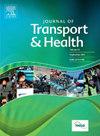Impacts of free bike share on social determinants among college students: a protocol for a quasi-experimental study
IF 3.3
3区 工程技术
Q2 PUBLIC, ENVIRONMENTAL & OCCUPATIONAL HEALTH
引用次数: 0
Abstract
Introduction
Bike share shows promise in enhancing health and reducing transportation barriers for college students, especially those from lower-income households. However, limited research has employed a pre-post study design to investigate health benefits, and studies have not stayed current with the evolving technology of bike share systems that expand its usage potential. This paper aims to investigate the impact of providing free one-year bike share memberships to university students on adoption rates, GPS-tracked usage patterns, and the resulting changes in students’ health and well-being, addressing transportation barriers and promoting active lifestyles.
Methods
A non-randomized quasi-experimental design is used at a Midwestern urban university involving two groups – an intervention group with a 1 -year bike share membership (n = 150) and a control group receiving a $10 gift card (n = 120) – assessing study aims with baseline and follow-up surveys conducted from August 2023 to May 2024.
Results
The study aims to address income and health inequities by investigating the impact of free access to a city-wide bike share system, anticipating positive outcomes on physical activity, access to necessities, and other social determinants of health. We anticipate follow-up data collection to be completed in May 2024.
Conclusion
By analyzing updated origin-destination and route data from a dockless bike share system, the research will contribute valuable insights into transportation equity, socio-demographic characteristics, and health impacts, potentially influencing sustainability, social inclusion, education and transportation policy.
免费共享单车对大学生社会决定因素的影响:一项准实验研究方案
共享单车有望改善大学生的健康状况,减少交通障碍,尤其是那些来自低收入家庭的大学生。然而,有限的研究采用了前后研究设计来调查健康益处,并且研究没有跟上自行车共享系统不断发展的技术,扩大了其使用潜力。本文旨在研究为大学生提供一年免费共享单车会员资格对使用率、gps追踪使用模式的影响,以及由此带来的学生健康和福祉的变化,解决交通障碍,促进积极的生活方式。方法采用非随机准实验设计,在美国中西部一所城市大学进行研究,分为两组,干预组为1年共享单车会员(n = 150),对照组为10美元礼品卡(n = 120),从2023年8月至2024年5月进行基线调查和随访调查,评估研究目标。该研究旨在通过调查免费使用全市自行车共享系统的影响,解决收入和健康不平等问题,预测在体育活动、获得必需品和其他健康社会决定因素方面的积极结果。我们预计后续数据收集将于2024年5月完成。通过分析无桩共享单车系统的最新始发地和路线数据,本研究将为交通公平、社会人口特征和健康影响提供有价值的见解,并可能影响可持续性、社会包容、教育和交通政策。
本文章由计算机程序翻译,如有差异,请以英文原文为准。
求助全文
约1分钟内获得全文
求助全文

 求助内容:
求助内容: 应助结果提醒方式:
应助结果提醒方式:


